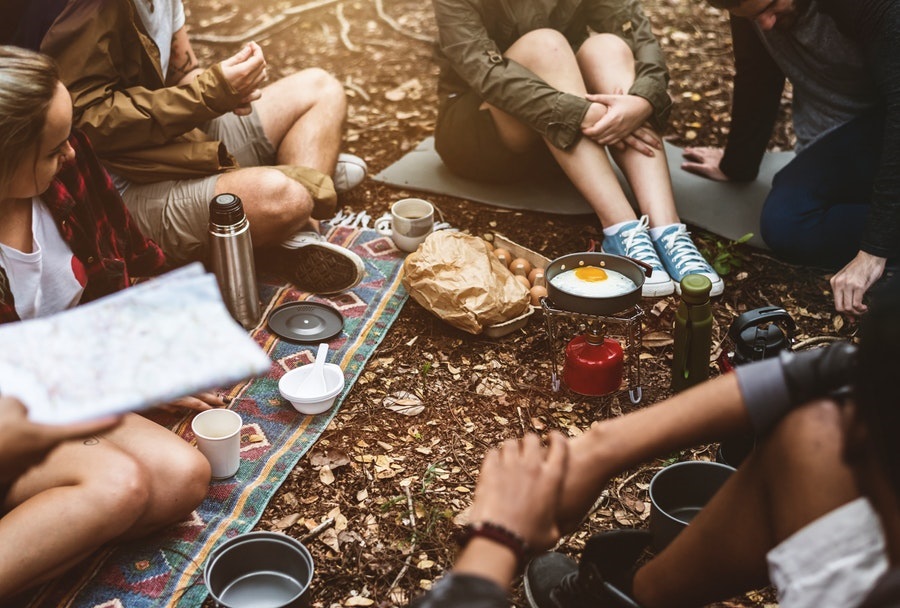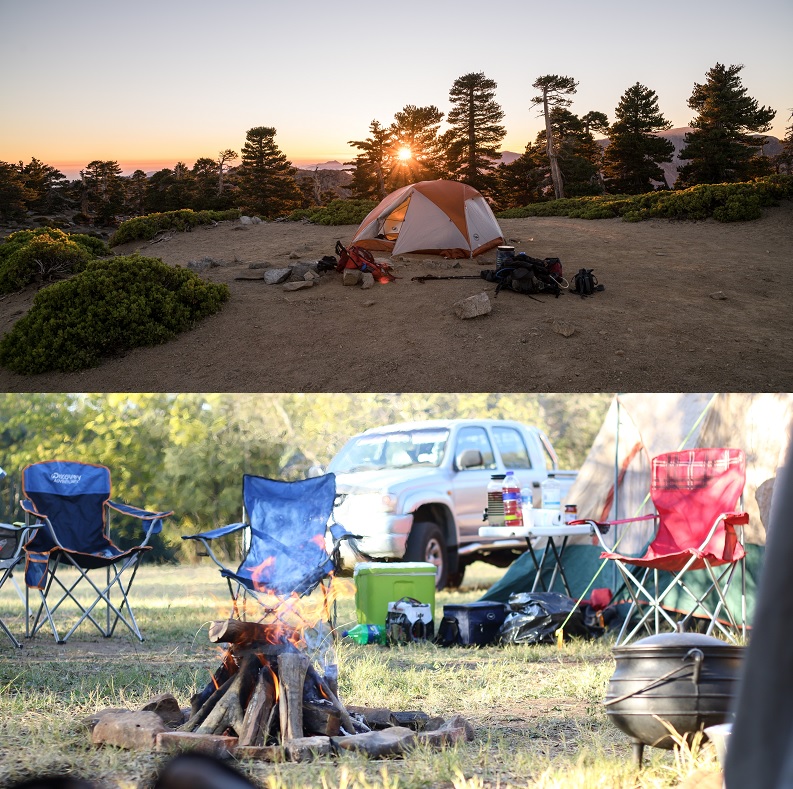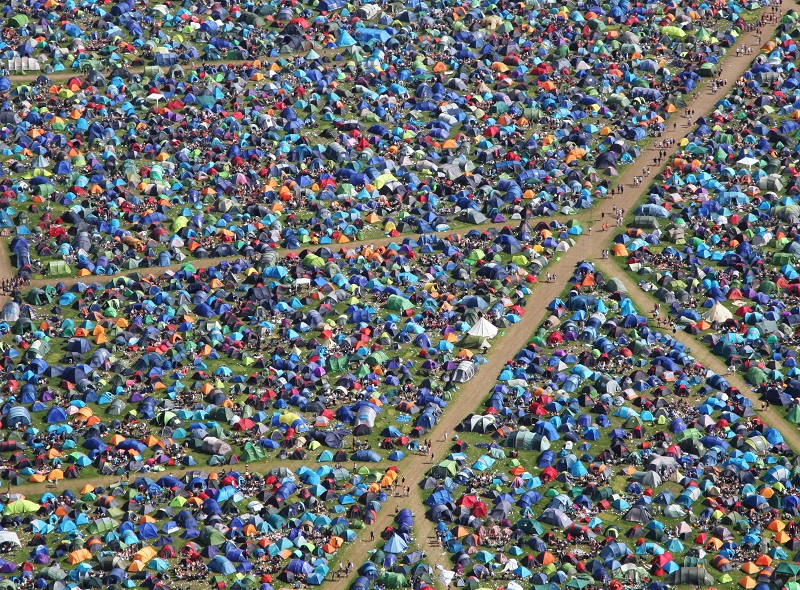Most camping checklist just list everything related to camping and if you were to take it all then you will simply have too much stuff with you. So I decided to make a list of things that you might want but I have also added alternatives or ways of using certain items for multiple applications. This doesn’t just cut down on what you need to take but also helps you look like you’re a camping pro.
That being said, I still have added a lot of items that will make your camping experience more comfortable but are not essential. If you want to travel lighter then don’t hesitate to adjust it to meet your needs. This will be handy if you are hiking into backcountry when this full list won’t be practical. So first, get a pen and paper and write down the things you need as you read through the list.
I have added small notes to some of the items that a beginner may not know about or why it’s needed.
As I said above, this is just a list of items but if you want to get a better idea of how you should plan a camping trip then read this post.
Setting Camp
- Shelter
This can come in many forms, the most common being a tent. However, don’t forget that there are other options, such as hammocks and bivys. Whichever you choose, always check the kit so that everything is in it before packing it away. Things like poles, pegs, paracord, rainfly, etc. can easily be left behind.
- Tarp
A tarp can be used for lots of thing. You can use it for shade, as a tent footprint, a wind breaker and even as a ground sheet to keep the dust down. I always take 2 or 3 tarps with me when I’m going camping with my family. They are so versatile. Just make sure you take some extra paracord or rope to help you hold the tarps where you want them. Extra poles and pegs are also advised but not essential.
- Camping Mallet
It’s always handy to have a camping mallet with you for driving tent pegs into hard ground. It will help you pegs last longer.
However, if you want to cut down on items to bring then this is definitely one you can leave behind. Most of the time I can use the heel of my boot to push them into the ground. Don’t stamp or it could go through your foot.
Failing that, I will use the back of my small hatchet, which is a much more useful tool. Even if you don’t have one of those you could just use a stone that is lying around, but be careful you don’t smash a finger.
Extra comforts
Here is a list of things that will help your tent feel more comfortable.
- Carpet or soft floor tiles for the inside of the tent.
- Fairy lights or camping lantern
- Temperature control
Keeping your tent warm or cool is one of the most important things you can do to for have an enjoyable camping experience. For ways of keeping your tent warm click here and for ways of keeping your tent cool click here.
- Dust pan/brush
It’s likely that some dirt will get dragged into your tent. Having a dust pan and brush are essential for keeping your tent clean and cosy.
- Boxes or plastic tubs
This is for keeping things organised and in place in your tent.
For Sleeping
- Sleeping Bags
Sleeping bags are the most obvious choice for camping but there is no rule saying you must use one. Feel free to take your favourite blankets or even the sheets from you own bed if you want.
- Pillows
Inflatable camping pillows are ideal for saving space but if this isn’t an issue for you then you can take your pillow from home. Alternatively, you can roll up a sweater and tuck under your sleeping bag at you head.
- Spare blanket
In some places the temperature can drop dramatically when the sun goes down. Be prepared and take a few extra blankets just in case.
- Foam mat/ inflatable sleeping mat/ camp cot
The last thing you want to be doing is sleeping on the hard ground. Even having a thin foam mat can drastically improve your sleep. If you intend on doing a lot of camping then I suggest getting a thicker blow-up mattress or cot. Just make sure your tent is big enough to accommodate the extra height.
- Air pump
Only of you have a blow up mattress
- Repair kit for air bed
Again, this is only if you have and air mattress. It is very common for an airbed to become damaged. The holes may be small and you might not realise there is a hole until you wake up on the hard ground. Have a set of patches with you just in case. I just take a set of bicycle wheel patches with me which have done the job in the past
- Hot water bottle
If you really want to spoil yourself and the weather is not too hot then putting a hot water bottle in your sleeping bags or bed 30 minutes before going to bed will make it nice a toasty.
Camping Furniture
- Camping Chairs
Not essential but can make things much more comfortable. Alternatively you could just take a cushion that you could put on top of a rock or log.
- Folding Table
This is actually a very important pieces of equipment. They are ideal for preparing food, cooking and eating at. The last thing you want to be doing is cooking on the ground. Even if you don’t take one, alway find a way to elevate where you prepare and cook your food.
- Storage Unit
Having somewhere to put things will prevent a messy campsite. Alway put your food and cooking utensils away after cooking to prevent unwanted wildlife being attracted to your site.
- Hammock
These are not just for sleeping in. Having a hammock set up in your camp is great for relaxing during the day.
Fire
If you intend on lighting a fire (and you know that you are allowed to) then you will need the following.
- Matches/lighter
I alway keep my matches and lighter in a airtight container (such as a ziplock bag) with some dry tinder. This will help you get the fire going. Of course, there are other ways to light a fire. I have already wrote about this here so have a look if you’re interested.
- Firewood
Again this will depend on where you’re camping but a lot of places will only let you burn wood that you have collected or bought from the campsite itself. Find out if you can bring your own before you go.
Campsite Kitchen
There are so many items you could take with you for your kitchen. The list below is just to help you think of things that you might need. I don’t expect you the take everything. The best thing you can do is the plan what you are going to cook and make a list of things you will need to cook them.
- Camping Knife
This item is so versitile that I could have put it under any heading. A good camping knife can be used for so many things but you will be mostly using it for preparing food.
- Water tank
You will need to consider how many people will be drinking the water and how long you need it to last. Is there a nearby shop where you can stock up easily or do you need to purify your own for a nearby water source. Remember, the bigger it is the heavier it will be so you might be better taking a couple of smaller tanks to share the load, rather the one large tank.
- Camping stove
Stove cooking is the most convenient way to cook your food at camp. Just don’t forget your fuel or it will be useless to you. You can also use an open fire to cook (if you are allowed one). Here is how to do that.
- Matches/lighter
This is an essential part of any camping trip for many reasons. While most stoves come with a igniter switch it is common for them to stop working.
- Plates/ bowls –Take plastic because it is lighter and less likely to break.
- Mugs/Cups – Again plastic or metal.
- Cutlery
- Thermal flask – It is a little harder to heat water at camp so it is good to be able to keep it hot for longer.
- Pots and frying pans – take old ones that you won’t mind getting a little charred if you decide to use an open fire.
- Old steel grill – especially if you intend on cooking over an open fire
- Containers – for food storage
- Cooking utensils – Tongs, wooden spoon, etc. It really depends on what you intend on cooking.
- Tin opener
- Bottle opener
- Vegetable peeler
- Oven glove – It’s easy for the handle of a pot or pan to get hot when cooking on an open fire.
- Kitchen foil
- Cooking oil
- Tea/coffee
- Salad/Mixing bowl
- Chopping board
- Cooler box
- Paper towels
- Bin bags
- Washing up liquid
- Ziplock bags
- Washing up bowl
- Tea towels
- Small Bin – And bin bags to collect your trash
- Seasonings/spices/condiments/sugar
Camping Clothing Gear
This will depend on where you’re camping, what activities you intend on doing and the time of year. I give a brief list below of some of the basic items but you will have to make a call for what extra you will need.
- Shoes/ boots
- Shower shoes/flip flops – For walking to and from the shower
- Trousers/skirt/belt
- Shorts
- T-shirts
- Warm sweater
- Socks/Underwear
- Sun hat
- Pyjamas
- Rain gear
- Gear for your chosen activity – Write down a list of activities and then write what gear you need for them.
Personal Items
- Towels/face cloth
- Soap/shampoo/shower gel
- Toothbrush/toothpaste
- Deodorant
- Comb/brush
- Razor
- Sunscreen/chapstick
- Insect repellent
- Toilet paper
- Personal medications – take extra in case you want to stay longer than intended.
Extra Entertainment
- Camera/battery/memory card
- Books/magazines
- Cards/games/toys
- Ball
- Mobile phone/Charger
- Battery radio
- Guidebooks/maps
- Compass/GPS – this is really if you are going hiking.
- Electrical extension lead – for campsite that have electricity but you might want to bring it a little closer to camp.
Trip Planning and Organisation
Know before you go,
- Maps/directions
- Reservation details
- Details of nearest Drs/A&E
Other Camping Items
- Torch/ Lantern
- Extra batteries/bulbs
- Insect repellent candles
- Water filters/purification
- Washing powder – just for campgrounds with washing facilities. Don’t use washing powder, or any other chemical in open water sources such as rivers or lakes.
- Clothes Pegs
- Clothes line/Paracord
- Duct tape
- Small shovel
- Hatchet
- Sunglasses
- First aid kit
- Tissues
- Pocket knife/Multi-tool
- Binoculars
- Water bottle
- Umbrella
- Sanitizing wipes
- Bear mace
As I said above, this is just a list of things to get you started. Add what you need and leave what you don’t and enjoy your camp.
If you have found this article helpful then please remember to share by clicking on one of the buttons below. It will help others find this article too.
Links from the post above;



